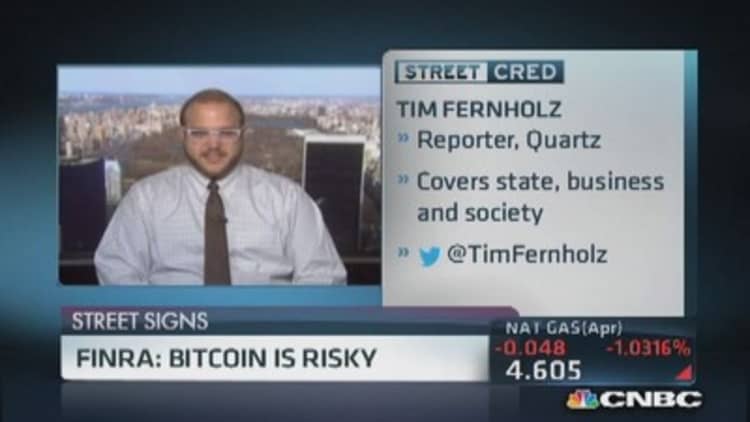
Cryptocurrency bitcoin, which has come under rising scrutiny since the recent collapse of Mt.Gox, has a much better shot as a payment mechanism than a currency, says Goldman Sachs.
"The most commonly identified properties of a successful currency are that it is: widely (if not universally) accepted as a medium of exchange (and) a stable store of value," Dominic Wilson and Jose Ursua economists at Goldman Sachs wrote in a report on Tuesday.
"To achieve this, fiat currencies are generally protected by extensive regulation. They are usually recognized as legal tender; the government is generally obliged to accept them for tax payments; and the central bank is almost always the sole issuer," they added.
(Read more: Bitcoin's back to the wall as it fights to survive)
In terms of universal acceptance, the legal status of bitcoin differs vastly around the world. Russia, for instance, has declared the virtual currency illegal; while Germany on the other hand, has embraced it.
In Germany, bitcoin is recognized as a "unit of account", meaning it can be used for tax and trading purposes.
On the stability front bitcoin hasn't scored very high marks. According to Goldman, the volatility of bitcoin prices so far has greatly exceeded the volatility of other currencies and gold.
(Read more: Why Mt.Gox collapse could ultimately help bitcoin)
Since hitting a record high of $1,240 in December, it has been on a wild ride, falling below $500 amid the troubles at Mt.Gox in late-February. It last traded around $637, according to Coindesk, which tracks the price on a selection of major exchanges.

Mt.Gox, once the world's biggest bitcoin exchange, filed for bankruptcy on Feb. 28, saying it may have lost nearly half a billion dollars worth of the virtual coins due to hacking into its faulty computer system.
There is no obvious mechanism that ensures that bitcoin will achieve that stability, said Wilson and Ursua.
(Read more: Disappearing bitcoins? There's insurance for that)
"For fiat currencies, central banks are tasked specifically with preserving a relatively stable value. To do that, they are able to vary the supply of currency. But bitcoin has no equivalent authority prepared to act to guarantee the stability of its value," they said.
Wide-spread use conceivable
Nevertheless, the bank says bitcoin shows more promise in terms of its payments technology.
"Although it is not yet 'widely' accepted, the ability to pay for goods and services using bitcoin is growing," they said.
"And the fundamental obstacles to bitcoin being used more broadly in the payments system are arguably not insurmountable, though connections with the conventional banking system are ultimately essential to its functioning," they added.
(Read more: Singapore'sfirst bitcoin ATM opens for business)
The absence of derivative markets makes it harder to manage and hedge risk around bitcoin's value, but it is possible to imagine how those could ultimately develop, Wilson and Ursua said.
"On net, more than taking off as a widely-used alternative currency, it is much more plausible that bitcoin eventually has a significant impact in terms of its innovation on payments technology, by forcing existing players to adapt to it or coopt it," they concluded.
—By CNBC's Ansuya Harjani. Follow her on Twitter @Ansuya_H



